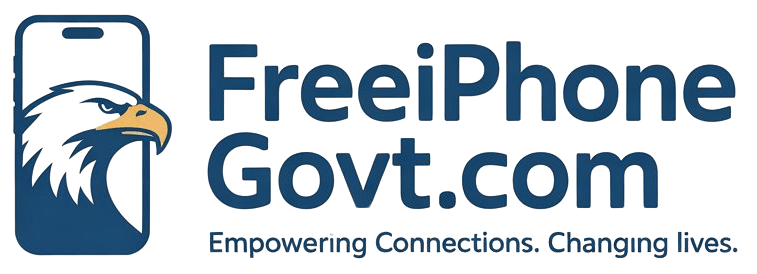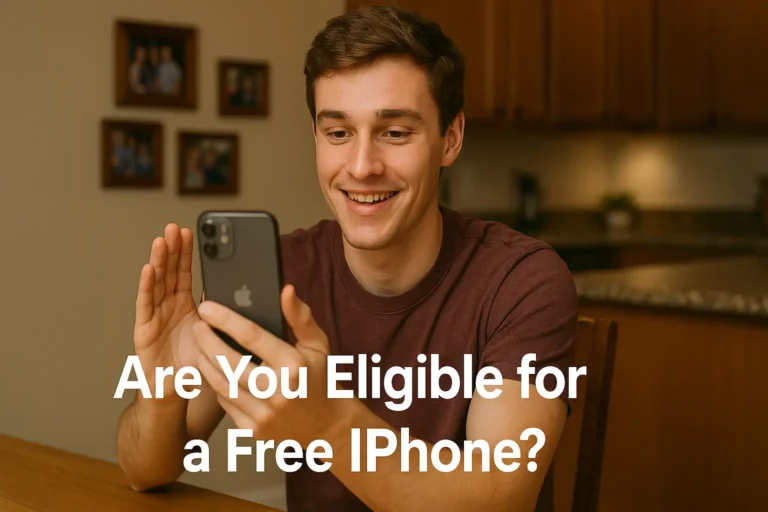Avoid Free Government iPhone Scams in 2025
Are You About to Be Scammed and Not Even Know It?
In 2025, scammers are smarter, faster, and more convincing than ever. They create fake websites, mimic real provider numbers, and pose as agents on Facebook or WhatsApp, all to steal your documents and identity.
The risk is real, whether you’re applying for the first time or recertifying your free government iPhone. This guide is here to protect you. You will learn proven scam tactics used today and how to respond if you have already been targeted. For a full walkthrough of the process, you can also review this free government iPhone application guide.
If you’re low income, disabled, retired, or a parent, this could save you from serious loss.

Clever Phone Scams Happening Right Now
1. Fake Lifeline Recertification Alerts
You receive a text or email: “Your Lifeline phone will expire. Click here to recertify.” The link looks legit, but it asks for:
- Social Security Number
- Date of birth
- ID documents
- EBT/SNAP proof
Then your data disappears. No confirmation. No service. Just fraud.
Avoid it: Visit only lifelinesupport.org. Never trust links in messages.
Advertisement
Caller ID Spoofing from ‘Assurance’ or ‘SafeLink’
You get a call from a familiar provider name:
- “We need your documents to finish your application.”
- “Pay $1.99 to receive your phone.”
It sounds official, but it is a scam.
Avoid it: Hang up. Go directly to the provider’s real website and use their contact number.
Social Media ‘Agents’ Offering VIP Approval
You see a Facebook post: “Get a free iPhone 14 – fast approval. DM now.”
They pretend to be from Q Link or SafeLink. After you send your ID, they vanish or use your information for fraud.
Avoid it: No government provider works through DMs. Apply only on verified websites.
One Safe Method to Apply or Recertify
Do not trust shortcuts or third-party promises. Here is the only secure process to follow:
Verified Application & Recertification Process
- Go to checklifeline.org
- Create an account using your email and phone
- Upload your government ID and proof of eligibility (EBT, Medicaid, SSI). You can review the required documents for a free government iPhone if you are unsure what to prepare.
- Wait for approval, then choose a provider:
- FreeiPhoneGovt.com (https://freeiphonegovt.com)
- SafeLink Wireless
- Assurance Wireless
- Q Link Wireless
Reminder: If you get a recertification notice, verify it by logging in at lifelinesupport.org, never through links sent via text or email.
What to Do If a Scam Has Targeted You
Scammers act fast; You need to act faster.
- Stop Communication
Ignore texts, emails, or calls from scammers. Do not click any links. - Report Identity Theft
Go to identitytheft.gov to file a report and get a recovery plan. - File an FCC Complaint
Report the scam at consumercomplaints.fcc.gov under “Phone.” - Contact Your Provider
Call SafeLink, Assurance, Q Link, or FreeiPhoneGovt to:
- Flag your account
- Reset access
- Open a fraud case
- Freeze Your Credit
If you shared your SSN, freeze your credit at Equifax, Experian, and TransUnion. - Save Evidence
Keep screenshots, messages, and documents.
Quick Tip: When in doubt, verify any communication at lifelinesupport.org.

Real People, Real Consequences
A SNAP recipient, Michael Carter, responded to a scam text and submitted his ID. His Lifeline account was suspended, and his information was compromised.
Janice, a retiree, messaged a fake Facebook agent offering a free phone. Her documents were used to open credit cards in her name.
Do not be the next victim. Always verify before you trust.
FAQs
Can I apply or recertify using my phone?
Yes, but only through official websites, not random links.
How do I confirm my provider is real?
Search at lifelinesupport.org/companies-near-me
What if I shared personal info with a scammer?
Visit identitytheft.gov, freeze your credit, and contact your provider.
Can I reapply after being scammed?
Yes. Once you secure your identity, use checklifeline.org to reapply.
Do real providers charge anything?
No. Lifeline phones are always free if you qualify.
Stay Connected, Not Compromised
Scammers are deceptive, but with awareness, you are in control. Use only official portals like checklifeline.org. Never trust messages or links from unknown sources, even if they look convincing. Before sharing documents, ask: “Did I initiate this? Is it verified?” A few seconds of caution can protect your identity, finances, and future.
Your phone is more than a device for staying connected to work, health, and family. Guard it like your life depends on it, because sometimes it does.
Stay sharp. Stay secure. And always verify before you apply or recertify.

Olivia is a trusted benefits specialist dedicated to helping households qualify for legitimate free government iPhone and connectivity programs. She reviews every update on our website to ensure the information is clear, compliant, and aligned with official FCC and USAC guidelines. Her work strengthens the credibility of our resources so users can apply with confidence.





